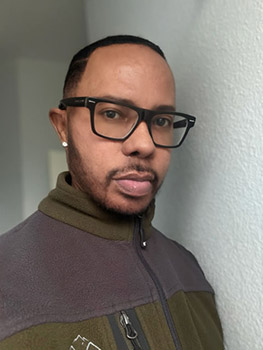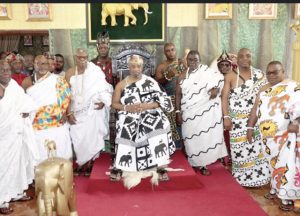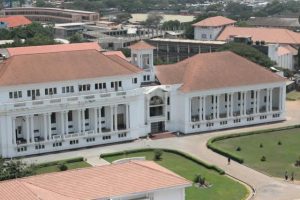

Features Africa Scene: Kwei Quartey by Michael Sears
Africa Scene: The Whitewashed Tombs by Kwei Quartey
 Kwei Quartey’s latest book in the award-winning PI Emma Djan series set in Ghana was released last year. The first book in the series, The Missing American, was an Edgar Award nominee, and winner of the 2021 Shamus Award for Best First PI Novel. Emma has grown with the series, and all the books have powerful backstories relevant to Ghana (and, in fact, to all of us).
Kwei Quartey’s latest book in the award-winning PI Emma Djan series set in Ghana was released last year. The first book in the series, The Missing American, was an Edgar Award nominee, and winner of the 2021 Shamus Award for Best First PI Novel. Emma has grown with the series, and all the books have powerful backstories relevant to Ghana (and, in fact, to all of us).
The backstory of THE WHITEWASHED TOMBS is the movements in some African countries to suppress LGBTQ+ people and deny them the right to marry. The context is one of prejudice and non-acceptance. Regrettably, Ghana is one such country, and Emma is drawn into a challenging and dangerous quagmire.
Kwei, in your introduction you say that this is a deeply personal narrative for you. Would you tell us about your motivation for writing this book?
THE WHITEWASHED TOMBS was born from a very personal place for me. As a queer Ghanaian-American writer, I have more at stake in this novel than any I’ve written before. The Ghana I knew was a place of warmth and welcome. But recent developments with anti-LGBTQ+ legislation and the rise of violent street justice against the LGBTQ+ community have shocked and saddened me. The pain of seeing such persecution in a place I held dear weaves into every page of this story. This novel allowed me to give voice to those who cannot raise theirs, highlight the hypocrisy and prejudice embedded in such persecution, and expose the truths behind these anti-LGBTQ+ movements.
Marcelo Tetteh, a gay activist, is murdered. His father approaches the Sowah PI agency because he suspects a hate crime and doesn’t expect the police to take it seriously. Immediately, it’s a potential issue at the agency because of a relationship between one of their investigators (who hasn’t made it public that he’s gay) and the victim. Emma Djan has to handle this aspect of the case as well as doing undercover work and coping with a betrayal by her boyfriend. Then she has to rescue the bloated body of the second victim from a flooding river. Did you set out to turn up the pressure on her?

Kwei Quartey
Indeed, I did. I wanted multiple elements coming at Emma Djan from all sides, including her relationship with Courage. I also wanted her to face a moral dilemma, i.e., how to help her friend Jojo in his tricky conflict of interest. In an environment where prejudice and violence against LGBTQ+ individuals are not just tolerated but encouraged, it would be unrealistic to have her investigation proceed without complications. Marcelo’s murder opens up a minefield of personal relationships, and Emma has to navigate the professional challenges, her undercover work, and a betrayal by someone she trusted. When she has to recover a second victim’s body from a river, it’s a stark reminder that she’s dealing with a killer who has no remorse. The mounting tension reflects the reality of such cases, where hatred drives people to unimaginable acts.
In the story, various churches and religious movements are active in pushing the anti-LGBTQ agenda, including one based in the US. Is this aspect of the story based on fact?
Yes. The influence of US-based evangelical movements on African countries is not fiction but a disturbing reality. The International Congress of Families, as depicted in the book, mirrors the real-life influence of several right-wing organizations that export their anti-LGBTQ+ agendas to countries like Ghana. Under the guise of promoting “family values,” they push harmful policies that fuel hatred and discrimination.

Chief of the Ga people and elders
Christopher Cortland and his wife Diana are the high profile leaders of the US-based International Congress of Families organization which makes it their business to support a right-wing view of family values. The ICF is comfortable using its influence in the government and its congregation to push its agenda in Ghana. They are supported by government ministers as well as evangelical pastors. Yet the stones they throw are smashing glass houses all around them. Would you comment?
Exactly. The phrase “throwing stones from glass houses” perfectly encapsulates the moral duplicity of these organizations. While they preach sanctity and traditional values, their own lives burst with contradictions and secrets. The Cortlands represent the kind of figures who are quick to judge and legislate against others while ignoring the fractures in their own lives and institutions. The idea of projecting righteousness while leading a morally questionable life is central to the story’s theme of hypocrisy. Like Christopher and Diana Cortland in THE WHITEWASHED TOMBS, outwardly pious and sanctimonious figures often have their hypocrisies and contradictions, and their power comes from the political and religious networks they manipulate.

Supreme Court of Ghana
Often there is an ambivalent relationship between a private investigation agency and the police. In Ghana, most of the police detectives seem to have marginal interest in the cases and only respond to bribes for favors. Does that situation with the police make it easier or more difficult for PI agencies to operate?
The ambivalence between private investigators and the police in Ghana stems from the often corrupt nature of law enforcement. Bribes and connections are frequently more effective than legitimate legal channels in getting things done. This corruption makes it simpler but more complicated for PI agencies like Sowah. On the one hand, they can bypass the police’s inefficiency by working outside the system; on the other, they face obstacles when cooperation is needed. The real tension arises when the police either ignore or actively cover up crimes, as in Marcelo’s case, because of his sexual orientation.
Given the attitudes and legal constraints on LBGTQ people in Ghana, how did you go about researching THE WHITEWASHED TOMBS?

Movenpick Hotel 5 star
Researching THE WHITEWASHED TOMBS was challenging because of the hostile environment surrounding LGBTQ+ issues in Ghana. Much of my research came from conversations with activists who risk their safety by advocating for LGBTQ+ rights and following international news reports and human rights organizations’ documentation of the situation. I also drew from my personal experiences in Ghana and its cultural pulse. I relied heavily on real private investigators in Ghana to gather facts for me undercover—in the same way Emma does!
What’s next for Emma Djan?
Emma Djan is growing stronger with each case she takes on. While her personal and professional challenges continue, we’ll see her becoming even more confident in her abilities as an investigator. I think the next phase for Emma will involve cases that push her even further out of her comfort zone, perhaps internationally, or cases that delve into deeper societal issues. I see her getting in too deep in an affair she should never have engaged in. She will continue to peel back layers of truth, exposing hidden dangers and risking everything to get to the bottom of things, no matter the cost.
Follow Kwei on social media:
X: https://x.com/QuarteyKwei
Facebook: https://www.facebook.com/doublekwei
Instagram: https://www.instagram.com/kweiquarteyauthor
Website: https://www.kweiquartey.com
- AudioFile Spotlight: March Mystery and Suspense Audiobooks - March 17, 2025
- Africa Scene: Shadow City by Natalie Conyer - March 17, 2025
- The Ballad of the Great Value Boys by Ken Harris - February 15, 2025
